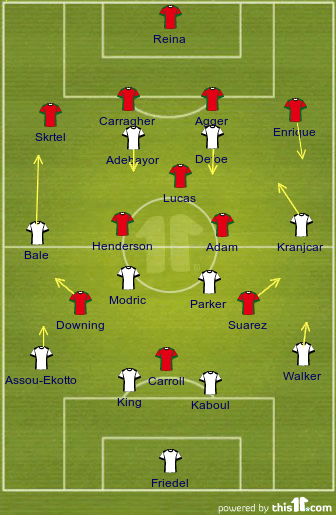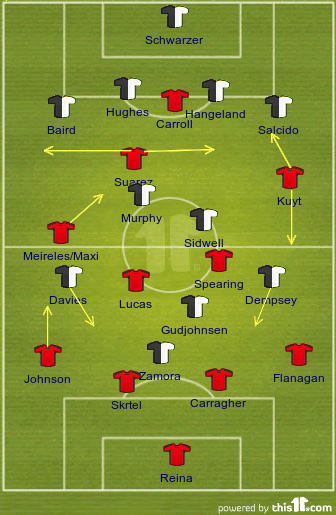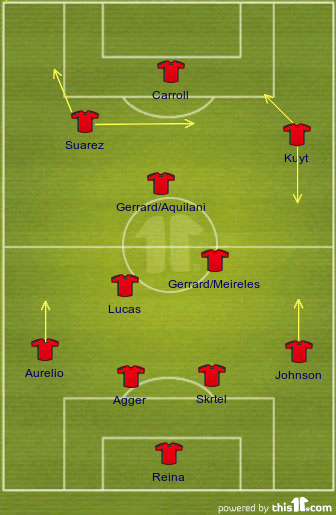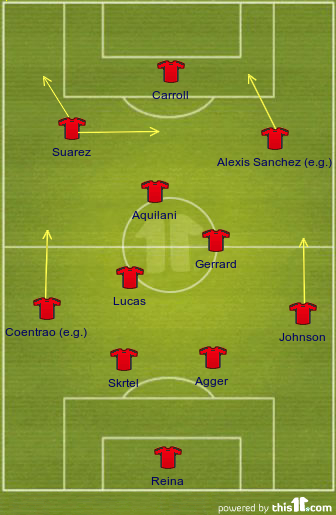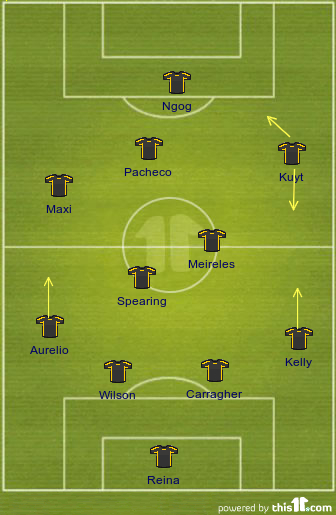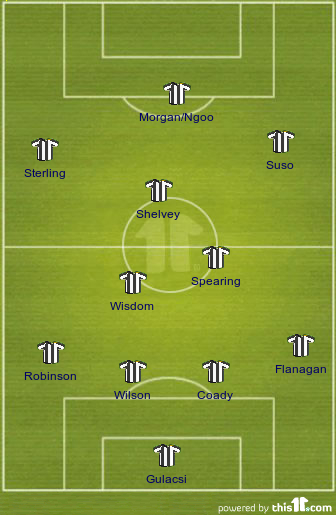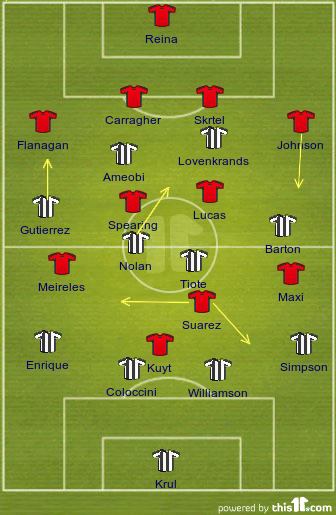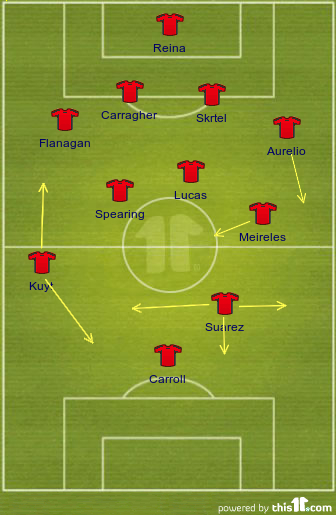Sunday, 18 September 2011
Tottenham 4-0 Liverpool
One of the most unpleasant games to watch as a Liverpool fan for quite some time.
First of all, it needs to be said that Tottenham were absolutely superb - the pace they hit us with at the start was irresistible, each player looked sharp and fulfilled their responsibilities dutifully. They were professional and disciplined when they needed to be, but never stopped entertaining their fans. Harry Redknapp's tactical performance was absolutely perfect - he made the most of our weaknesses, and used his midfielders and strikers well to drag us out of position. So congratulations to Spurs.
Also, I don't know if perhaps there were one or two slightly harsh yellows (although I'm not even sure that there were), but on the whole the referee did his job well and I would be hugely disappointed if the referee's performance came to be used as a shield against criticism of Liverpool. That's the Wenger way, and it means problems don't get solved, they just keep recurring.
So Liverpool retained Henderson in the starting line-up, but dropped Kuyt to make way for the return of Andy Carroll. Tottenham lined up more-or-less as expected, except that Aaron Lennon was not fit to start, so Nico Kranjcar came in on the right wing:
Liverpool's narrow 4-3-3 was problematic for a number of reasons. Firstly, and most obviously, it played into Tottenham's hands vis-a-vis an obviously important match-up: Bale vs Skrtel. Bale is an orthodox winger in the sense that he likes to start from a deeper midfield position and accelerate towards the full-back, so you either need the full-back to come very deep to mark him, or (more intelligently) to use a deeper winger (i.e. Kuyt or Henderson could've done this) to track back and stop him before he can reach full speed. As it was, Downing, with an attacking remit and a tendency to drift inside onto his stronger left foot, was nowhere to help out Skrtel. Skrtel was eventually sent off (although the team-shape had been sort-of rectified by moving Henderson to the right after 15 minutes). The point is, Liverpool's midfielders played extremely narrow, all getting dragged into closing down Modric but ultimately getting caught in no-man's-land, leaving Skrtel and Enrique seriously isolated. See this heatmap from ESPN Soccernet (Bellamy, number 39, a late-substitute, is the anomaly):
Another big issue was the passivity of the shape. I've talked about passivity before, and how it is increasingly important to be assertive and aggressive in the modern game. Hodgson's Liverpool were very passive, sitting and waiting for the other team to come to them, whereas Benitez's teams were assertive and aggressive, very rarely letting teams settle. On this occasion, with Lucas sitting in the deeper holding role, Henderson and Adam should've been responsible for stemming the play from Modric and Parker, but they dramatically failed to do so. Adam's timing of challenge is occasionally terrible, and his decision-making and discipline is a serious weakness of a player who can be very important when on his game, but often ends up being carried by the rest of the team. He was sent off. Meanwhile, Henderson was painfully anonymous. I have tended to defend Henderson against criticism, but he simply was not suited for today's game, and it was disappointing to see quite how much he let it pass him by. He just wasn't aggressive enough, and he really, really needs to improve in that sense if he is to be a long-term success at Liverpool. Ultimately, Liverpool's passive formation (with a holding anchor-man midfielder) didn't suit the fast-paced closing down they had clearly been told to do, so players got tired, frustrated, and made rash challenges.
So, from a tactical point of view, Dalglish's plan failed miserably. Lucas kept getting drawn out from his deeper role to close down Modric (who, smartly, stayed fairly deep to dictate the flow of the game) - but the distance he had to travel to get close to the excellent Croatian playmaker was too much for him to disrupt Tottenham's flow. Instead, a space opened up where Lucas had been, meaning that Adebayor and Defoe could comfortably receive the ball to feet (Modric ultimately completed 98 passes, while Adebayor made 65!). With three central midfielders against Tottenham's two (for the first 15 minutes), we should've been able to dominate possession, but our midfielders were simply in the wrong positions, trying to fulfil the wrong roles. Thank God Gerrard will return soon.
From an attacking point of view, we could mostly never get going because we couldn't get near the ball. But when we did, Carroll looked isolated, as Downing and Suarez were caught somewhere between trying to provide cover on the wings and trying to support the lone target-man. Carroll came in for a lot of criticism on Twitter, and perhaps from a tactical point of view he wasn't an ideal player to have on the wing when we needed to keep possession, but I didn't think he was that bad, and I assume Dalglish thought he would offer a goal-threat from set-pieces. He also didn't resort to throwing strops and making rash tackles like some of Liverpool's other players. The real villains today, in my opinion, were Charlie Adam, Martin Skrtel (although, in a foreign position, he should be afforded some leniency), and Dalglish and his coaching staff.
On Twitter, Liverpool fans have also been searching for positives. Some people have suggested Jose Enrique played OK, but I actually think we should've been brought down to Earth with the realisation that he isn't the perfect left-back we might've thought we'd signed from some of his performances. His positioning was often poor, and Tottenham were often as much of a threat down our left as down our right. It says a lot that Sebastian Coates (on after Daniel Agger's injury) was probably our best player, although he was positionally at fault for two of Tottenham's goals. Still, he did a decent job in difficult circumstances, and I would include the necessary lunging foul on Adebayor in that assessment. Carragher wasn't bad either, but he kept Adebayor onside for the fourth. Lucas did his best, but needed another combative midfielder to help him - it was interesting that we started to look slightly calmer once a fellow-enforcer (Jay Spearing) had come off the bench.
All in all, everyone made mistakes, and we would've lost this game against this Tottenham side pretty much regardless of red-cards and defensive errors, but many of us have been left particularly frustrated by some baffling tactical decisions by Liverpool's management team. Hopefully we can learn from these mistakes and bounce-back at Brighton on Wednesday.
Sunday, 10 July 2011
Kristoffer Peterson - "I'm not afraid to shine"
Saturday, 28 May 2011
Man United vs Barcelona - Brief Preview
And Michael Cox has previewed the game excellently, as well as highlighting some important lessons from the previous final of 2009. He points out that one of Ferguson's biggest problems is that, with Darren Fletcher unfit, a midfield pairing of Ryan Giggs and Michael Carrick is nowhere near sturdy enough to deal with Barca's Busquets-Xavi-Iniesta(-Messi) central midfield. He also questions whether Chicharito ought to start for Man United - something which is likely to be Ferguson's most significant tactical decision.
And elsewhere, everyone's favourite Champions League-winning manager Rafael Benitez lent his name to a dazzling double-spread preview in The Times.
So I'll just offer my own humble prediction of how each side will line up, and, consequently, where the game might be won or lost.
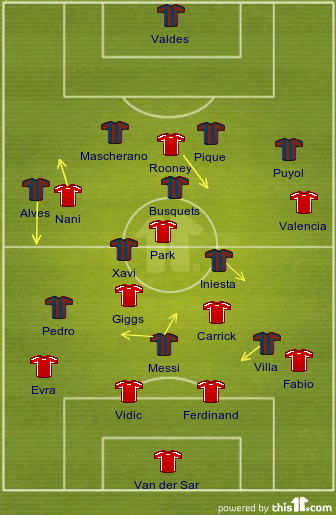
Everyone knows more or less how Barcelona are likely to set up. With Abidal unfit, Mascherano will probably come into the defence and push Puyol out to left-back. The consensus on United, however, is that they will start in their usual 4-4-1-1 formation, which they have used for most 'big' games in the second half of the season, with Chicharito up front and Rooney just behind. However, I think this line-up makes more sense, and I think Ferguson will be tempted to use it.
It allows Park, the ultimate harrying 'defensive forward,' to close down Busquets, who, as Sid Lowe has pointed out, is absolutely integral to Barcelona's play. During (inevitable) periods of sustained Barca pressure, Park can drop deeper onto Xavi, allowing Giggs to pull wide and track Alves, while Rooney can drop onto Busquets. This allows Nani, one of United's shining stars this season, to stay permanently higher up the pitch, where, if the ball breaks quickly into the left-channel, he can be one-on-one with Mascherano who he can beat, or at least draw fouls and bookings from. It might also encourage Alves to stay deeper, which would severely hinder the fluency of Barcelona's attacking play. As such, Nani would become the only player without a serious pressing remit, but would be regularly afforded space wide, and would be able to isolate one of Barca's weakest links (as strange as that may sound when talking about Javier Mascherano - he is not a natural centre-back).
From a defensive point of view, of course it still relies on United's back-four remaining solid - retaining shape is absolutely vital, because Barca's players will wait and wait for their chance to capitalise on any players being dragged out of position. David Pleat wrote in the Guardian that Rio ought to be brave in stepping out of defence to track Messi, but Messi, playing as a false-nine, tends to drop into the centre-right position, which would mean Vidic would have more responsibility for him. If Vidic is left too exposed, though, and is constantly dragged out of position, he is liable to get in trouble with the referee.
Thursday, 19 May 2011
Aston Villa vs Liverpool - Tactical Preview
There are a few points of interest in this game. Gerard Houllier had his 'emotional homecoming' at Anfield in December of course, and although he sadly won't be present on Sunday, another ex-Liverpool favourite Gary McAllister will be in the Villa dugout. Also, it's no secret that Liverpool have been sniffing around Ashley Young and Stewart Downing for some time now, and a move to Anfield for one of both seems to be on the cards this Summer. The travelling fans in red will be hoping that Villa's two creative wingers save their best for next season however, as Liverpool continue their push for fifth place (which now relies on Tottenham failing to beat Birmingham City at White Hart Lane on Sunday).
At this stage of the season, it's always difficult to predict line-ups, but a win for Villa could theoretically take them as high as ninth-place (from their current 13th), so they're likely to put out their strongest possible team. A solid defensive performance and two good Darren Bent finishes won the points for Villa away at Arsenal at the weekend, so I suspect they'll stick with much the same line-up, with the exception, perhaps, of Fabian Delph who was playing only his second game of the season after a return from injury (and also might be a bit worse for wear: he said the Villa boys were planning to have "more than a few pints" to celebrate their Emirates victory). I suspect he'll be replaced by either Gabby Agbonlahor or, more likely, Marc Albrighton in a 4-2-3-1 (which often looks like a 4-4-1-1), but it's possible that Emile Heskey (who tends to feature in most home games) will regain his place upfront alongside Darren Bent. McAllister might also want to give Michael Bradley (in place of Reo-Coker or Stiliyan Petrov) one last run-out before his loan agreement expires, and Ciaran Clark has been agitating for a return to the first team.
Dalglish, on the other hand, may well name an unchanged team, despite having endured a surprise defeat to Tottenham in the last game. Raul Meireles has returned to training after the injury he suffered at Craven Cottage, but it seems likely that Maxi Rodriguez will retain his place on the left of midfield, and Dalglish will want to persist with his favoured Carroll/Suarez strike-partnership while they are both fit. There is a possibility that Fabio Aurelio will return from injury to take John Flanagan's starting place, and Spearing might be dropped in favour of the more creative Jonjo Shelvey, who has impressed in recent substitute performances. But, in all probability, the teams will line up like this:
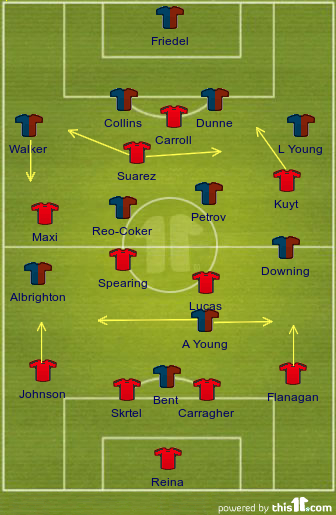
The two team shapes are clearly quite similar, and in these situations games can become a little stodgy and stunted, so both sides will be relying on their expensive January signings to make the difference. Darren Bent has been caught offside more regularly than any other player this season, and he spends an awful lot of his time on the shoulder of the last defender. This paid dividends against Arsenal's poorly organised defence, as Bent was able to break their shoddy offside-trap for both of his goals (although the finish for his first goal was genuinely excellent). As such, you can bet that Dalglish and Clarke have been working on Liverpool's defensive line in training this week. Bent also relies on Villa's creative players to provide him with chances, so it seems likely that Lucas and Spearing will have been given instructions on how to deal with Ashley Young's intelligent play, especially if he is given the free role behind the striker, and Downing has been a creative force for Aston Villa too this season, so Liverpool's right-back (most likely Flanagan) will have to do a good job of stopping his crosses from deep.
From Liverpool's point of view, if they do keep the same team, certain aspects of their game will need to improve substantially from the Tottenham game - most significantly in terms of the transition between defence and attack, which was poor at Anfield on Sunday. If Aston Villa do a good job of stifling Suarez, as Dawson and Sandro managed to do with some success, then Liverpool might look stolid and one-dimensional. For this reason, another cameo appearance or even a starting place for Shelvey seems likely, as he is a player who can stretch and bisect otherwise sturdy defences with his smart passing play.
On the whole, a low-scoring draw seems a likely result, but Liverpool have recorded a few surprise thrashings in the last few weeks (away at Fulham, for example) so I wouldn't bet against a victorious end to the season for Dalglish's team.
*****
Addendum: 21/05/2011
Some leaked team news suggests that Johnson, Maxi and Carroll are all left out for Liverpool, with Aurelio and Meireles returning to the starting line-up, and that Jonjo Shelvey has a place in a 5-man midfield behind Luis Suarez. To me, this is excellent news, and should see us employing a shape similar to the one we used against Fulham. We lacked a player with Shelvey's creative abilities against Tottenham (until he came on, that is), and hopefully he'll be able to demonstrate to the Liverpool fans how effectively he can dictate play from the midfield. Here's a revised tactical lineup:
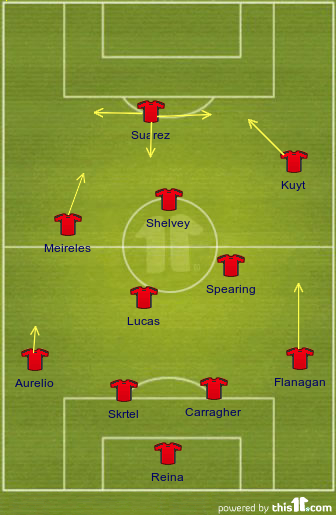
Monday, 16 May 2011
Liverpool 0 - 2 Tottenham Hotspur
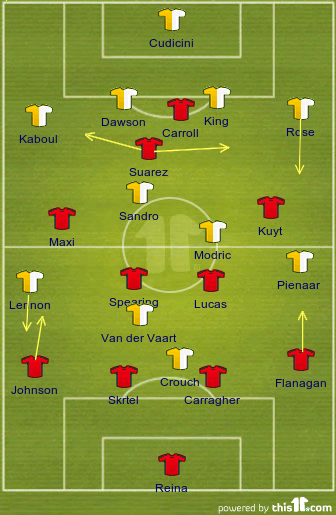
This was a fairly even if unremarkable game, neither side had many clear chances, but ultimately Tottenham made the most of their breaks, while Liverpool weren't able to raise their game to the level of recent weeks. The home side's build-up play was bitty, and there was very little of the flowing pass-and-move football which had livened up Liverpool's past few games. Some will lay the blame at the feet of Andy Carroll - wrongly, in my opinion, as he performed fairly well, and his build-up play was fine. There is, however, a question to be asked about whether Carroll fits into Liverpool's best (in the sense of being the most effective) eleven.
But that is a question for another time. The main problem for Liverpool on Sunday was their inability to deal with Tottenham's patient pressure and possession football - not that it posed a real threat to Pepe Reina, but it was disheartening to see that Tottenham were able to comfortably dominate for large periods, especially in the first-half. Part of the problem lay with the defensive shape which, although sturdy, didn't easily allow Liverpool to turn defence into attack. This diagram shows what happened when Tottenham held possession in Liverpool's half:
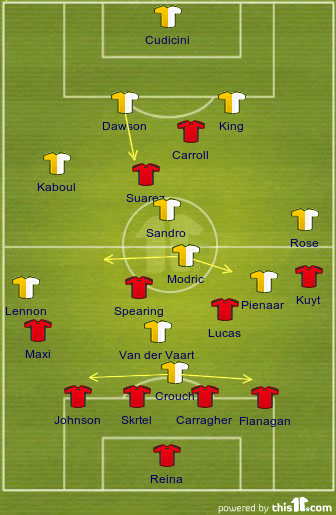
The back four would squeeze very narrow, and the two wide midfielders would track their opposing wingers very deep - Maxi in particular had clearly been instructed to double up on Aaron Lennon. In the main, this neutralised Tottenham's attacking threat (their goals came from a deflected shot from a corner and a dodgy penalty decision, after all), but once Spurs were a goal to the good, a more pro-active approach was needed. Modric's dynamic playmaking dominated the midfield where white shirts outnumbered reds 4-to-2 on occasion, with Pienaar drifting in from the flanks and Van der Vaart dropping deep to receive the ball.
The problem was that Liverpool didn't have the personnel available to them to diffuse the pressure and grab a hold of the game. I am not, generally, overly critical of the current squad, but we missed a ball-playing defender like Daniel Agger (who is injured), and, perhaps more crucially, a real quality midfield playmaker in the mould of Alonso or Aquilani who could hold onto possession in tight spaces and pass the ball out from defence when under pressure. We also didn't have the kind of wingers who could carry the ball up the pitch, so Spearing and Lucas tended to attempt risky direct passes more frequently than they perhaps should have. Sandro did a good job of anchoring the Spurs midfield which limited the opportunities for easy passes to Suarez in particular. And their backline stayed deep even when Tottenham had possession which meant that Liverpool couldn't diffuse pressure by hitting simple balls over the top or into the channels for Suarez or Carroll to chase. There was quite a large gap between the two front-men and the two defensive 'banks of four,' and it is possible that the inclusion of an extra attack-minded central midfielder (like Jonjo Shelvey, who was impressive again in his brief substitute appearance) in place of Andy Carroll might've given Liverpool a better chance of winning the game.
Friday, 13 May 2011
Liverpool vs Tottenham Hotspur - Tactical Preview

Tottenham’s post-Real Madrid meltdown has been so severe that certain Spurs fans have felt compelled to question Harry Redknapp’s future at the club. They have, after all, won just one of their last thirteen games – a run which has included home draws against Blackpool and West Brom, and, most recently, a defeat at Eastlands which ended their hopes of regaining a Champions League qualification spot. Redknapp has, in my opinion, done a decent job at Spurs on the whole, and doesn’t necessarily deserve too much criticism after two seasons which have been Tottenham’s most successful in recent history.
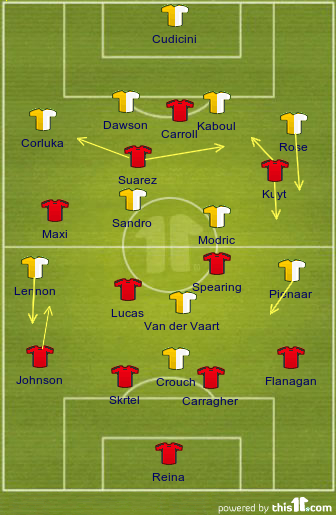
Monday, 9 May 2011
Fulham 2 - 5 Liverpool
Pass and move is very much the Liverpool groove again. The result was beyond doubt within 15 minutes thanks to some frankly abysmal Fulham defending and, more pertinently from a Liverpool fan's point of view, a display of scintillating attacking football by the away side. Fortunately, the whole game was an enjoyable spectacle, as Fulham attempted a spirited come-back after half-time but Liverpool continued to attack with real purpose, and it feels like there are a surprisingly large number of talking points to be drawn from what might have been a fairly inconsequential Monday-night Premier League fixture.
Fulham were punished for adopting an extremely attacking mentality from the off - it's hard to know whether this was their initial game-plan, they might have been forced to readjust after going a goal down within 35 seconds, but they played wide, pushed up and committed midfielders and full-backs to attack. This left a lot of space for Kuyt, Maxi and Meireles to break into, and Suarez exploited Fulham's dodgy back-line superbly, punishing them time and time again. He looks dangerous whenever he gets the ball at his feet. Indeed, opposing defenders will now be having nightmares about getting exposed one-on-one with El Pistolero.
It's amazing to think that the general consensus, both amongst fans and in the media, is that Liverpool should be buying a lot of players in the Summer - but it's hard to imagine who can be dropped/sold if they do. They have scored 17 and conceded just three in the last five games. Even £35million Andy Carroll will struggle to regain a starting place with the team in such a rich vein of form without him, which is a testament to the fast-paced pass-and-move relationship which Suarez and Kuyt in particular have developed. Steven Gerrard, too, should have to prove that his early-season lacklustre form is well behind him if he is to regain one of the midfield starting spots when he returns from injury. It's quite incredible how effective Jay Spearing in particular has been with Lucas in the midfield these past few games. Glen Johnson (two assists and a faultless defensive performance tonight) is now routinely showing the form which has made him England's number 1 right-back, and although a world-class left-back should be sought this Summer, John Flanagan has been reliable when called upon.
When Meireles picked up a second-half injury, Jonjo Shelvey came on in his place and immediately impressed in his cameo appearance, particularly in terms of his ability to pick a pass, and his interplay with Suarez. Hopefully if he stays injury-free next-season he'll be able to make a bigger contribution. He is another who will soon be competing for Gerrard's place in the starting line-up.
I had also planned to write something on Skrtel (who has been widely overlooked for Liverpool's player of the season, even as 2nd or 3rd choice, despite having performed solidly in nearly every game this season), or Reina (who made his 150th consecutive start for the club), or Carragher (who, after tonight, has made more appearances than any other Liverpool player besides Ian Callaghan). They will all have to wait for another time, though, as tonight we should just rejoice in the fact that glorious attacking football has returned to a Liverpool team which, despite being tipped for a relegation battle earlier in the season, is now impressing with every single performance and looks odds-on to claim fifth-place in the Premier League.
Saturday, 7 May 2011
Fulham vs Liverpool - Tactical Preview
Monday, 2 May 2011
Summer Transfer Strategy - Why Liverpool only need a left-back and a pacey winger

Sunday, 1 May 2011
Liverpool 3 - 0 Newcastle United

Thursday, 28 April 2011
Liverpool vs Newcastle United - Tactical Preview
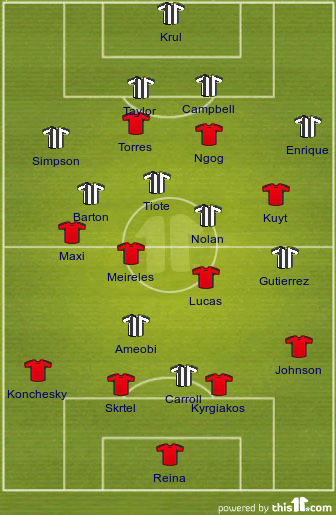
It was Pardew's first game in charge after Chris Hughton had been unceremoniously replaced, and Newcastle still had Andy Carroll in their arsenal (he provided the knock-down for the first, the flick-on for the second, and rifled in a twenty-yard screamer for their third). Kuyt had capitalised on a mistake by the creaking Sol Campbell to equalise with the softest whimper of a deflected goal you're ever likely to see but it will, above all, be remembered as the scene of Woy's bizarre face-rub, a slightly disturbing sign (if any were needed) that he wasn't cut out for the job.
Although, at times, Liverpool had played fairly well - there was, after all, some genuine quality on the pitch - the game represented the real dark depths of the Hodgson era. The flat, narrow, rigid 4-4-2 looked stodgy and predictable, the Torres-Ngog strike partnership proving particularly fruitless, and aimless deep crosses from Paul Konchesky were a regular feature. The change in Liverpool's fortunes since, though, is remarkable.
Probably only four or five players of the same players will feature in red on Sunday, and the formation will be quite similar in terms of notation, but the real revolution has been in the momentum, strategy and optimism of the side (examined by others here and here). Assuming Carroll regains his fitness in time, he should return to face his old club. If not, Kuyt will probably move up front and Maxi Rodriguez will retain his place after his hat-trick against Birmingham at the weekend. Pardew's favoured team seems to be the one which faced Blackpool, so they will probably be unchanged unless he decides he'd prefer Ranger to Ameobi:
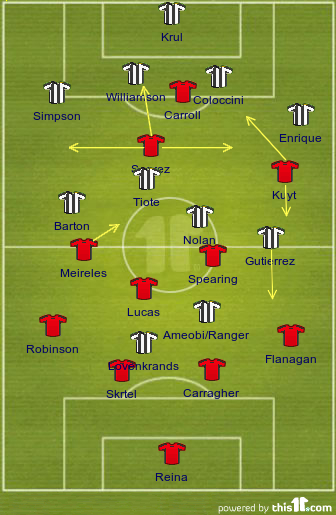
Newcastle tend to play fairly narrow, especially away from home, so the fledging full-backs Robinson and Flanagan may still have to wait for their first serious test at professional level (although Gutierrez's pace and skill may cause Flano some problems if Kuyt doesn't track back). Kevin Nolan is something of a dark-horse in the scoring charts this season (he has 12 in the league, level with Chicharito and Van der Vaart), though he has been less prolific since Carroll and his knock-downs went west. The athleticism of the young Nile Ranger, who looked dangerous when he featured against us as a substitute at St James' Park, could cause some concern for Carragher and Skrtel if he is selected, and Barton's creative influence has been genuinely impressive since he moved to the right-wing, but, on the whole, they do not look like a team particularly equipped with the attributes to frighten a Liverpool side high on confidence.
Tiote and Enrique have been good for Newcastle this season, but both are liable to panic in possession when under pressure, so if Kuyt and Suarez do a good job of closing down, Liverpool might capitalise on their mistakes. Barton defends well, so the home side might struggle to make attacking progress down their left unless Suarez pulls wide to take on the comparatively erratic Danny Simpson.
On paper Liverpool should win this comfortably - they have won 5 of their last 6 league home games, patently have the stronger squad, and have a variety of effective strategies for attack, whereas Newcastle's away form has been poor all season. However, even under Dalglish Liverpool have been prone to bouts of inconsistency this season, so will need to be careful if they are to continue their push for one of the European qualification spots.
(Just as an aside, this article by Paul Tomkins and Paul Grech shows how Liverpool's excellent performances against teams with higher reputations this season sees them in 1st place in the top-six mini-league. If only the English Premier League winner was decided, as in Major League Soccer, by a knockout play-off tournament between the top 8 teams!)
Wednesday, 27 April 2011
Real Madrid v Barcelona - Preview
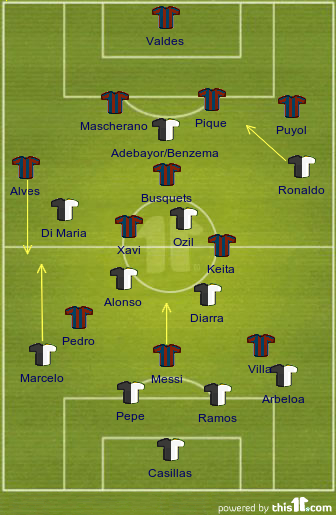
Khedira and Carvalho are unavailable for Real Madrid. This would normally mean that Albiol would come into central defence, but I am not convinced that Mourinho trusts him. Remember he was sent off in the most recent league meeting between these two sides. As a result, I think Pepe will drop into the centre-back position, vacating the defensive-midfield role he has filled so well in recent weeks. This allows for a slight reconfiguration of the Madrid line-up, bringing in the disciplined Diarra in place of the comparatively energetic and impetuous Khedira, and reverting to their usual formation for home matches - 4-2-3-1.
Mourinho had moderate success fielding three defensive midfielders against Barcelona in their previous two meetings - the 1-1 draw at the Bernabeu in the league (Madrid claiming an equaliser with 10 men), and the 1-0 AET Copa del Rey final victory - and will have learnt some important lessons from the way that his side was humiliated in the away league fixture earlier in the season when they fielded a more offensive side. So why would he risk getting soundly beaten again when his defensive line-ups have had more success?
For one, it's a matter of strategy for Mourinho. Like when his Inter side faced Barcelona at this stage of last season's competition, he will probably want to go out and attack aggressively and energetically at home, in the hope of having a lead to defend when Madrid travel to Camp Nou.
And, although tactics aren't crucially distinct from strategy, there are more traditional tactical benefits to be noted. Firstly, the 4-2-3-1 makes it easier for Madrid to press Barcelona high up the pitch, in comparison with the comparatively passive 4-3-3 which would leave Busquets unattended in the centre. In addition, the above formation allows CR7 to be positioned on the right-wing where he can attempt to expose whoever Barcelona choose to play at left-back in the absence of their first three choices (Abidal, Adriano and Maxwell).
Sunday, 17 April 2011
Arsenal 1 - 1 Liverpool - Talking Points



Friday, 15 April 2011
Arsenal vs. Liverpool - Tactical Preview
"Football is not a predictable game. A team can have 20 chances and still lose to a side that musters only one. All a coach can do is manipulate the percentages as best he can in his favour. With that caveat in mind, though, a prediction – in the next decade, no side will win a major international tournament playing an orthodox 4-4-2.
"When a good side play with three central midfielders, whether in a 4-2-3-1 or a 4-3-3 (or either of their close cousins, 4‑2‑1‑3 and 4-1-2-3), they will almost inevitably dominate possession against a side playing only two central midfielders. The old defence of a high offside line simply is not as effective as it used to be thanks to the liberalisation of the rule.
"Even if the three do not dominate possession, fielding only two central midfelders leaves a side vulnerable if one of those central players pushes forward, a problem that dogged Manchester United in European competition for much of the late 1990s..."
Clearly Wilson focuses exclusively on the negative aspects of the 4-4-2 - it does, of course, have its merits - but the points he makes are important ones. Due to a numerical disadvantage in central midfield, teams playing a 4-4-2 will generally struggle to dominate possession, and will often leave too much space between the lines for the opposition to exploit.
With this in mind (I am not, generally, a fan of the 4-4-2 formation), and also on the basis of the different players we had available at the time (since the 25th of March, Agger, Johnson, Kelly and Gerrard have all been ruled out injured for the rest of the season), I suggested that Liverpool should be playing a 4-3-3 formation with Suarez stationed ostensibly on the left-wing in my piece 'A few tactical points for the rest of the season.'
The side we fielded against City and will probably field against Arsenal is not greatly different from this 4-3-3 - the key change being that Meireles now takes up a left-sided position and Suarez moves more centrally (although of course he is free to move across the entire pitch in search of space). In reality, despite the change in notation from 4-3-3 to 4-4-2, the differences are not overly insignificant, because Meireles will regularly look to cut inside, doing much of his defensive and attacking work in the centre of the pitch, and Suarez will often move to the left touchline to receive the ball (see the chalkboards below). It seems that Meireles played as a 'wide-central-midfielder' against City (see Zonal Marking's 'central winger' article if you find my terminology counterintuitive).

There are pros and cons of giving a central-midfielder a wide role. On the plus-side, if wide players 'tuck in' it can create more simple passing options for the central midfielders, making it easier for teams to retain possession and counteracting some of the weaknesses of the 4-4-2 formation in general. Wide players cutting in also creates space for the full-back to charge forward, which is increasingly important in today's game, but it also ensures that there is player with adequate defensive skills always available to help double-up on opposing wingers. Watch how Aurelio combined with Meireles, and occasionally Suarez, in this compilation of his performance vs. Man City (via @milankakabaros):
On the other hand, wide-players who don't offer much in terms of pace, skill, and ability to beat their man can often become passengers, and leave the team stunted in attack. Maxi Rodriguez (sometimes unfairly) has this criticism levelled at him - despite often playing a similar role to Meireles, it is expected that a certain degree of flair and creativity come from the wide-players, especially in terms of beating the full-back, getting to the by-line and crossing the ball for the likes of Carroll to attack. This is part of a more general problem, that playing central midfielders on the wing can mean the team severely lacks width, making them predictable and staid, especially if the full-backs can't get forward, or the forwards don't pull wide often enough.
Fortunately, Liverpool's energy and inventiveness against City ensured that this wasn't a problem, but at the Emirates on Sunday this system might be tested more sternly. For starters, we can assume that Van Persie will do a better job of occupying Liverpool's centre-backs than Dzeko did, which will leave Carragher less free to move across and support the fledgling Flanagan. Kuyt will have to produce a similarly heroic performance in terms of tracking back, tackling and closing down if Arsenal's left-sided players - i.e. Clichy and (probably) Arshavin - are to be stopped. Also, there is a hell of a lot more creativity in a midfield containing Nasri, Wilshere and Fabregas than was offered by Barry, Milner and Toure, so Lucas and Spearing (and Meireles) will have to be vigilant in their closing down and denying them space between the lines. Still, Suarez should be able to find space if Arsenal's midfield pushes forward, and Carroll is exactly the kind of physical, fearsome forward that can cause the likes of Koscielny and Squillaci/Djourou problems. It should be an interesting game.
Monday, 11 April 2011
Liverpool 3 - 0 Man City
Wednesday, 6 April 2011
Champions League Quarter Finals First Leg - Talking Points
Tuesday, 5 April 2011
Tottenham Hotspur vs Real Madrid - Brief Tactical Preview
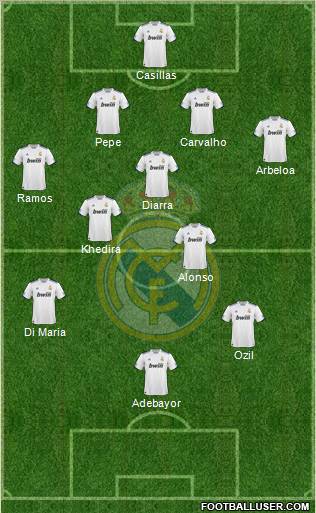
Admittedly, this formation is in some sense designed to achieve a scoreless draw, which might seem a bit too unambitious for a club like Real Madrid. Although not entirely devoid of attacking merit (RM's three deep midfielders will force Spurs to patiently concede them possession, or go and press higher up the pitch, leaving space in front of the defence for Ozil or Khedira to break into), it is indeed reactive, in the sense that it is designed to counter Tottenham’s strengths. But it should actually allow Madrid to be less passive in the game overall, by stemming Spurs’ attacks at the root (i.e. Modric, Bale), rather than risking a regular flow of balls to Crouch which would surely cause Pepe (6”1) and Carvalho (5”11) some serious problems.
Saturday, 2 April 2011
West Brom 2 -1 Liverpool - Talking Points

After a promising first 15 minutes, we depressingly devolved into the familiar Neanderthal image of Hodgson-era Liverpool. Lamentable injuries to Johnson (torn hamstring) and Agger (knee strain?) forced us into extreme defensive functionality early on, and the game was never particularly exciting (despite some late scrappy goalmouth action). To be fair, we might still have won this. Skrtel scored a header from a corner early in the second half and after that we looked comfortable until Kyrgiakos clumsily gave away a penalty. The big Greek had a nightmare all in all, and was consistently embarrassed by the excellent Peter Odemwingie. As it was, West Brom deservedly won thanks to two penalties. They were more dominant in midfield and looked more dangerous in attack.
1. All in all, attempts to pass the ball out from the back were half-hearted and impatient. Without Agger, Johnson and Kelly, the link between the defence and midfield was absolutely terrible. Carragher just functions as a right-sided centre-back more or less, always getting drawn inside, closer to his own goal, forcing Kuyt to come deep to defend. His passing is very poor – his inevitable punts forward to Carroll looked more aimless than usual. Young Danny Wilson, too, is solid and shouldn’t be judged solely on his performances at left-back, but he was poor. He doesn’t possess the attacking instinct necessary for a modern full-back. Suarez looked particularly lonely when he came to find space on the left wing. As Brom's average position diagram shows (below), their right-back Steven Reid (no. 12) and for the last few minutes Gonzalo Jara (no. 36) stayed relatively deep, preferring to keep goal-side of Suarez. Chris Brunt, their right-sided midfielder (no. 11), regularly looked to move inside which would've made the presence of a quality ball-playing left-wing back all the more useful for Liverpool.

2. Lack of quality on the wings meant that Liverpool had to hope they could wrestle control of the midfield, but for various reasons they were unable to. In all honesty, Jay Spearing was pretty poor, and fairly anonymous. Meireles had one of his most peripheral games for Liverpool too. Lucas wasn’t at his best, but his positioning and closing down was good as usual, particularly in terms of his ability to show players onto their wrong foot or to quickly get goal-side when opposing players were in dangerous positions, which obviously isn’t reflected in the statistics. It was hugely disappointing that we never managed to get at the West Brom defence more, which had looked decidedly shaky for the first few minutes. Liverpool were rarely able to sustain possession in WBA’s half, and almost never managed to attack the space behind Carroll effectively. Perhaps Dalglish should’ve brought on Maxi for Spearing or Meireles early, to allow Suarez to move inside and get closer to the big Geordie who was, on the whole, pretty poor as well. He wasn’t helped by physical defending from Olsson in particular.
3. As noted above, Kyrgiakos was very poor, but Skrtel was pretty good as usual, as was Reina who, despite conceding two goals and giving away the second penalty, could lay claim to Liverpool’s man of the match by virtue of the sheer number of saves he had to make.
All in all, WBA deserved the win, but I think we would’ve taken the three points if it weren’t for the early injuries. This doesn’t bode well for the rest of the season, and we’ll have to pray that Johnson and Agger (as well as Aurelio) return sooner rather than later.
***************
Opposition fan's view - Josh Harris (@JoshMDH)
Olsson and Meite are strong, hands-on defenders in a very literal sense, and I didn't fancy their chances against Suarez's pace and quick feet. As it turned out this didn't matter because he saw so little of the ball.
Carroll was wound up by Olsson from the beginning. This frustration led to his being given a yellow card and left him unable to exert his physical presence. Conversely, Odemwingie was excellent, as he has been all season, and several times embarrassed the very sluggish Kyrgiakos, a match-up which ultimately led to both penalties.
Mulumbu and Scharner provided toughness in central midfield, leaving their counterparts Meireles and Lucas nowhere in an attacking sense. This toughness however sacrificed creativity, and with Dorrans, Morrison and Tchoyi unavailable Brunt often drifted in from the right wing to try and make something happen. The space this freed up on Liverpool's left was thoroughly unexploited by Meireles who was anonymous throughout. In the second half Suarez moved into the left channel more regularly and looked a lot more dangerous up against Reid who is not a natural full-back.
Ultimately, Liverpool looked uninspired, and Dalglish was hampered by the two enforced substitutions leaving him little opportunity to change things up. That said, Spearing should probably have been swapped out in the second half in favour of a more creative Liverpool midfielder.

